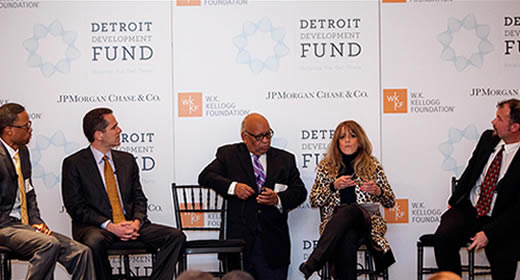
Michael S. Barr, Joan and Sanford Weill Dean of Public Policy at the Ford School, participated in a roundtable discussion at Detroit’s Gem Theater this morning, during which JP Morgan Chase, the W.K. Kellogg Foundation, the Ralph C. Wilson Jr. Foundation, Fifth Third Bank, the Kresge Foundation, and others announced significant new investments in Detroit’s Entrepreneurs of Color Fund (EOCF), tripling the fund's value from $6 million to $18 million.
Launched in 2015, the fund provides loan capital to Detroit’s entrepreneurs of color and to neighborhood-based small businesses who primarily hire local residents. Michael S. Barr was one of the architects of the fund, along with U-M alumni James Wahls (BA ’03, JD ’06) and Paul Brown (BA ’96, MBA ’08).
At the roundtable, Detroit Mayor Mike Duggan, W.K. Kellogg Foundation President and CEO La June Montgomery Tabron, JP Morgan Chase CEO Jamie Dimon and others described the fund as an example of a successful city-business-nonprofit partnership to support minority-owned businesses. Detroit Development Fund President Ray Waters noted that the fund was remarkable in that it had a zero loan default rate -- and that a significant part of that success could be attributed to the technical assistance entrepreneurs receive through the University of Michigan’s Detroit Neighborhood Entrepreneurs Project and other providers.
Entrepreneurs of Color Fund loan recipients Felicia Maxwell of Fit4Life and Kenneth Porter of the Porter Media Group spoke about the fund’s impact on their own business growth. Both businesses were able to hire employees and purchase capital equipment with loan proceeds.
Dean Barr, who has noted that generally, minority-owned businesses begin with less capital than their non-white counterparts’ businesses, says EOCF’s built-in loss reserve makes it possible for the fund to extend credit to small businesses that might not typically qualify for bank loans. Of the 43 businesses funded by the EOCF, Ray Waters said, none would have qualified for traditional bank lending. That funding, combined with technical assistance, can provide a ladder that allows a business to graduate to being loan eligible by major financial institutions.
To help more minority-owned businesses access EOCF loans or use loan money effectively, Barr partnered with colleagues from the Ross School of Business, the Stamps School of Art and Design, and the Michigan Law School to establish the University of Michigan’s Detroit Neighborhood Entrepreneurs Project (DNEP) in 2016. Since then, the partnership has expanded to include faculty and students from the Ford School of Public Policy, the College of Engineering, and Department of Electrical Engineering and Computer Science.
The Detroit Neighborhood Entrepreneurs Project, coordinated by the Center on Finance, Law, and Policy at the Gerald R. Ford School of Public Policy, provides wrap-around, one-on-one services to neighborhood-based small businesses in Detroit. This includes legal advice, business and financial services, and design assistance to help solve small business owners’ most pressing problems. "Services are free for entrepreneurs and invaluable for students," says Christie Baer, program director for the DNEP. "This is a reciprocal learning process. Students emerge with real-world experience and a better appreciation for the complexities of running a business and the challenges minority entrepreneurs face."
“The [EOCF] is one way to ensure more Detroiters share in the city’s continued economic recovery,” writes Jeffrey McKinney for Black Enterprise. “And the unique and scalable structure of the loan fund and technical assistance it provides has become a model for how to help minority entrepreneurs expand in other cities.”
The morning roundtable has already attracted significant media attention, with stories that include:
- “Fund for black-owned Detroit businesses balloons to $18 million,” by Jeffrey McKinney for Black Enterprise;
- “A Detroit fund for minority-owned businesses is about to get much bigger,” by Matthew Heimer for Fortune;
- “Detroit’s Entrepreneurs of Color Fund grows over $18M,” by the Associated Press; and
- “JPMorgan fund for Detroit entrepreneurs just tripled,” by Jackie Wattles for CNN Money.
